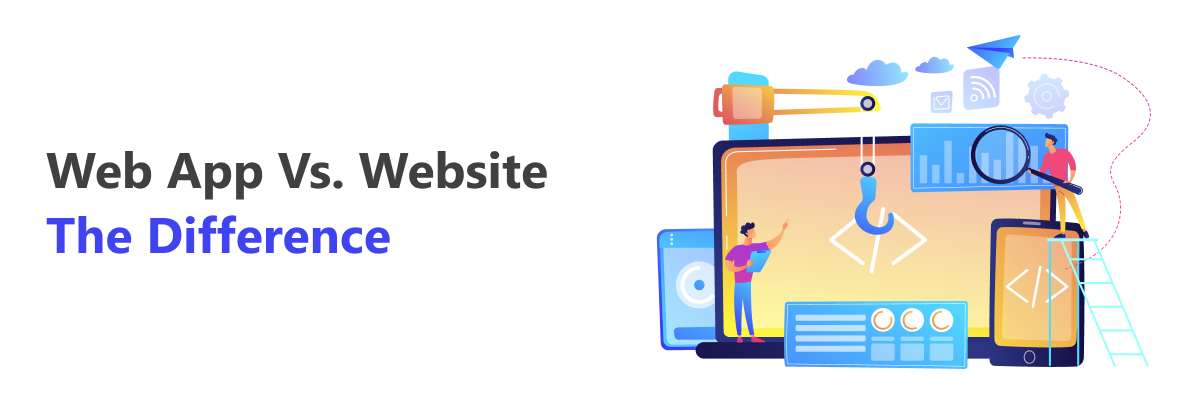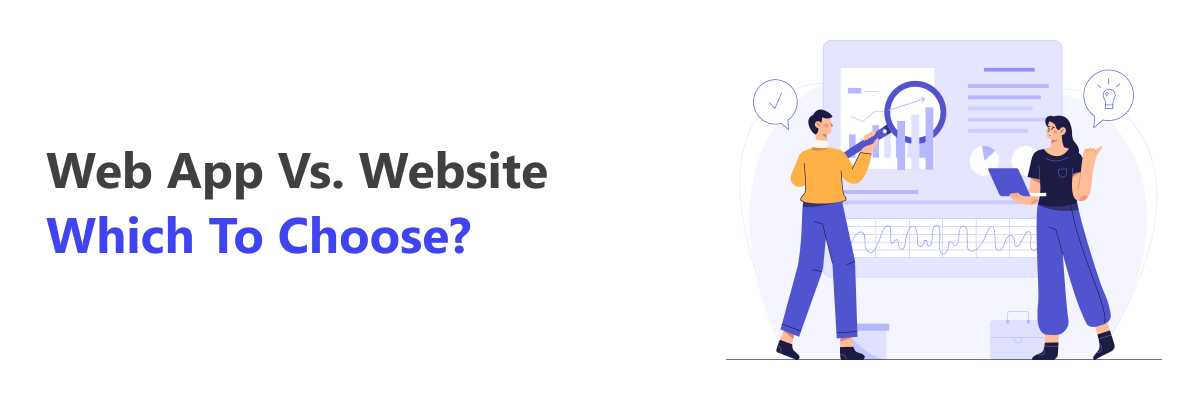Think of an online tool that streamlines your business and also gives a competitive advantage over others.
Impressive, right?
Yes, we are talking about websites and web applications.
Well, websites and web applications can remarkably help you level up your business. But, how will you know whether a web app or website is right for your business?
Today, developing a website has become one of the crucial parts of business decisions. But, building a web application is releasing a whole new stream of possibilities for your business.
To decide what you need for your business, you have to understand the purposes they serve.
So, in this article, I will explain their similarities and differences and will help you decide the right one for your business. Once you choose the suitable option for your business, you need to find a trustworthy partner that can assist you in achieving your business goals.
Difference Between Websites and Web Applications

Websites and web apps play an essential role in our daily lives. Everyone today uses Google, Facebook, YouTube, and Wikipedia to a large extent not knowing their differences.
So, let us take a look at what a website and a web app are.
A website was this classic HTML- a group of globally accessible interlinked web pages with a single domain name. An individual, or a business, or an organisation can develop and maintain a website. It is hosted on a single or multiple web server. A website is accessible through a network like the Internet or a private local area network through IP address.
Modern websites use more than HTML today. They are more intuitive and include languages like JavaScript and Cascading Style Sheets (CSS) with feature-rich designs.
However, the purpose of the website remains the same. It provides required information to the users, and it is a tool for marketing. Wikipedia, Google.com, MSN.com, and CNN.com are examples of website.
Features that a good website must have:
Browser Steadiness
It is important to confirm that your website behaves and appears steadily across all browsers like Internet Explorer, Firefox, Chrome.
Well-Organised Information Pattern
Plan your website categories and sections wisely and present data in a way that makes it easy for users to find. Always think from your user’s perspective. If you are offering a wide range of information, this way of presenting your information will improve your site’s usability.
Good navigation is an important aspect of website usability. Simple static HTML files or JavaScript menus will work best and seem reliable on all browsers and platforms. Note that the navigation should be clutter-free. Limit the number of menu items as much as possible. You can use a drop-down menu or sub-navigation if you have many sections and pages.
Mobile-Compatibility
More and more people are using their mobile devices to access the Internet. So, a mobile optimised website has become a necessity. If you have a website, check if it is mobile-responsive. If not, make it mobile optimised and scalable to different screen sizes and touch sensitivity.
Faster Load Times
A website that takes a long time to load keeps the users annoying, which is one of the main reasons they leave the website. For good usability, make sure your site loads within 4 to 6 seconds. It also affects your search engine ranking that makes you visible to your users.
A web application is a software or program that is running in a browser. It is an action-oriented web tool to provide a specific service to the user through an interface.
Web apps use augmented Rich Internet Application (RIA) technologies like JavaFX, Flash, and Silverlight.
Other than just informing, web apps can be a service in itself. A web app can allow the users to perform many actions such as account creation, booking hotels, editing photos, ordering food, shopping, chatting, etc. Some examples of web apps are Gmail, Google Drive, Skype, Slack, Twitter, Photoshop, and Trello.
Features that a successful web application must have:
Security and User Authentication
Most web apps involve a user authentication system to verify a user’s credentials. It involves a high degree of interaction and exchange of user’s data. So, the layers of security involved in the development process are stringent and robust.
And if the app needs some kind of monetary interaction, the security features that should be integrated in the web app are much more secure.
Payment Gateways
It is a platform for authentication and processing money transactions between your web app and your customers. By supporting various payment systems, web apps make it easy for users to enable online payment that fits their preferences. It is a great option for ecommerce applications as it combines shipping, billing information, and payment methods into a single step.
Live Chat
Offering live chat is the best way to connect with your customers to understand their pain points. You should help your customers to resolve their issues effectively. Helping with this kind of viable solutions help to build valuable customer relationships. It also help you learn more about the people who are buying your products/services.
Social Integration
Imagine that your users are trying to register to your app. What if it takes so much time to complete the process? Of course, they will get frustrated.The solution to this is you could consider integrating social media platforms to streamline the registration process.
With social media integration, users can quickly log in from their preferred social media account. They don’t need to fill lengthy forms, and users will enjoy the benefits of signing up as customers. Make sure you think of integrations with your user’s favourite social networks.
This integration can offer valuable ways for users to interact with your brand. The customers can hare their reviews, orders, etc., through social networks. And it would ultimately lead to higher brand visibility.
Web Push Notifications
Web push notifications can be a handy feature if you are looking at engaging your customers. When it comes to connecting with customers in real-time, web push notifications can offer the most personal channel.It’s pretty simple.
One-click opt-in directly from the web apps, and you can send targeted push message to your user’s devices based on location/behaviour.
According to case studies by Google, web push notifications have considerably delivered higher engagement and retention from push-enabled users. So, this feature is something that you should integrate into your apps.
Also read: 10 Powerful Web Development Tools in 2021
Web App Development
Get a FREE estimate of your high-converting web app.Avoid the guesswork & know the exact pricing of your web app now.

Quick snapshot of Web App Vs. Website.
| Parameter | Web App | Website |
|---|---|---|
| Designed for | A web app is primarily designed to be responsive to user actions. It provides users the ability to handle data and make requests for different outputs | A website contains static content. It makes it easy for users to navigate and extract relevant content that meets their needs. |
| Authentication | As web apps offer a wide range of options than websites, it needs authentication. | Authentication is not mandatory for informational websites. The user may ask to register to receive regular updates or to access extra options. However, this feature is not available for unregistered website visitors. |
| Interactivity/Gaming | For gaming/interactivity, a web app is the best choice. | It is not a good choice. |
| Complexity | Due to the complex functionality of the web app, the integration is complicated. | Integration is simple here. |
| Software Type | A web app itself is not a complete website. Instead, it is a part of the website. | A website is a complete product in which a user can access it through a browser. |
| Visibility | A web app’s visibility is limited to manufacturer app stores. Also, publishers cannot share/direct apps like websites. | Users can easily find websites, and they can be shared easily. In addition, publishers can direct users to a website from a blog or other websites. |
| Updation | Users have to download the app first and then update the app on each type of device to receive updates. | If you make any changes in content or design, they are visible to the users immediately. |
| Push Notifications | Intricate feature-push notifications enable publishers to send messages to the users directly. | It allows web-based push notifications. |
| Compilation | The site must be pre-compiled before deployment. | There is no need for precompilation. |
| Deployment | For every change you make, the entire project should be recompiled and deployed. | For minor changes, there is no need for complete recompilation and deployment. You just have to update the HTML code. |
| Offline Availability | Provide offline access to content/perform functions without a network connection. You can locally store the data and then have it upload once a connection is established. | A network connection is required |
What About Progressive Web Apps?
You might have heard a lot about Progressive Web Apps (PWAs). A PWA is an application software type that is delivered through the web. It is built using common web technologies such as HTML, JavaScript, and CSS.
PWAs intend to work on any platform that uses a standard-compliant browser that includes both desktop and mobile devices.
The entry of PWA in web development is almost new. Even so, it is showing prospects that will help in developing better web applications.
Its promising benefits are:
- They are accessible everywhere, so you get a wider reach
- It helps users to browse fast
- Painless updates
- They are installable, making them accessible from the home screen just like any other application.
- It is highly beneficial for startups or companies looking to save the cost of developing a native mobile application.
Some examples of PWAs are Pinterest, Starbucks, Housing.com, etc.
Web App Vs. Website: Which is Right for Your Business?

All websites are not web apps, but all web apps are websites. Suppose you need your visitors to do something more than just going through the information on your website. For that you choose to integrate a live chatbot application on it. A single application like this will never change your website into a web app. And, if you want to make your visitors interact by adding unique ways such as customisation, user accounts, etc., this addition will affect your website performance. To include such functionalities, you need to build a web app.
So, a website makes more sense when you want to:
- Provide a pool of information to the users about your business
- Have a global presence
- Let your potential customers know about your business story
- Educate users about your brand through timely articles and blogs
- Market your business to a broader audience
- Have a resource centre for staff, in which your employees can upload pictures, instructional videos, and more to assist users
- Boost your credibility and legitimacy in the market
- Increase your customer support
A website changes to a web app when its purpose shifts from information to interaction. Like I said, if you want to have all such interactive functions mentioned above by maintaining your website’s performance, you need to build a complete web app.
And it can be done by using technology stacks like AngularJS, etc. There are plenty of software companies out there to help you with that. All you have to do is to find the right tech partner for your business to get optimal outcomes.
So, a web app is suitable for your business when you want:
- To solve specific problems based on your business
- To establish a powerful connection between you and your customers
- More than just branding your business online
- To improve your sales and revenue through efficient customer service
Also Read: Mobile App or Website: Which is Better For Your Startup?
Conclusion
If your needs are primarily to share information with the users, you may prefer to go for a website. However, if your business needs are complex and you expect a higher degree of user interaction with more functionalities and features, you should better opt for a web app.
Whether you want to develop a web app or a website, you need a reliable development partner like NeoITO who understands your business needs and provides you with the best possible solutions.
We are a leading mobile app, and web app development company that believes turning your ideas into reality is important. We helped multiple entrepreneurs transform their businesses by assisting them to grow fast from zero to multi-million dollar evaluation. So, we are always here to help you level up your business.





